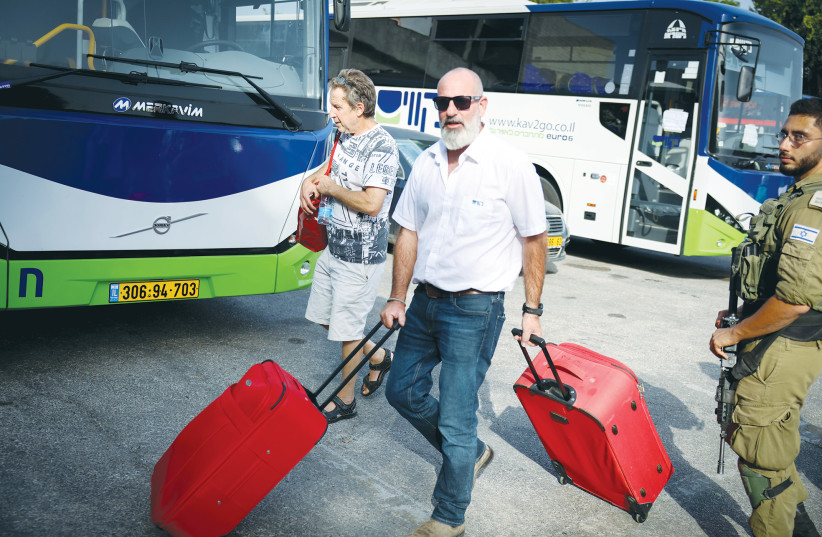The Iranian-backed terrorist group Hezbollah continued to attack Israel over the last week. The terrorist group believes it has impunity. Even though Israel has struck back at Hezbollah, the group believes that every attack it carries out will be met with an equal or proportional reaction. It is time to begin to change this equation. With the war against Hamas entering a less intense phase and with planning for any kind of operation in Rafah taking place, it is now time to consider what is to be done with Hezbollah.
First of all, let’s remember how this started. Hezbollah is an Iranian-backed group that often serves as a proxy for Iran. It has been operating in Lebanon since the 1980s. Iran has used it to focus attacks on Israel. From Iran’s perspective, this is a win because Iran can use Lebanese to fight Israel but not have to have Iranians do the dirty work of Tehran. Iran also can open a frontline on Israel’s border using Hezbollah.
The terrorist group in Lebanon has also occupied Lebanon illegally and stockpiled 150,000 missiles and rockets. It has taken over swaths of southern Lebanon and intimidates local residents. It uses Lebanon as a launch pad to attack Israel. It has also been increasingly infiltrating Syria to threaten Israel. In 2018, Hezbollah sent a terrorist cell with drones to Syria to threaten Israel from an area near the Golan. Hezbollah continues to carry out these types of threats today. It is infiltrating Syria because it wants to extend the frontline against Israel.
Hezbollah openly boasts that it has forced Israel to evacuate communities along the border. Israel evacuated these communities after Hezbollah joined Hamas in attacks on Israel in early October. While Hezbollah did not go all-in with a massive attack, it has preferred to keep most of its powder dry through smaller daily attacks. However, those attacks add up, and Israel is suffering casualties among civilians and army personnel in the north.
Hezbollah attacks have now reached into the thousands, including missiles, mortars, and drone attacks. In the last weeks, Hezbollah has targeted IDF bases and facilities in the north, as well as many civilian communities.

For instance, on Friday, March 15, Hezbollah carried out attacks from Lebanon targeting areas along the border. The IDF said that Hezbollah targeted “Shtula, Mount Dov, and Zar’it in northern Israel.”
The IDF said that ‘IDF fighter jets struck a Hezbollah military site in the area of Houla, as well as an observation post belonging to the terrorist organization in the area of Marwahin. Furthermore, IDF artillery struck in the area of Wadi Hamoul in order to remove an imminent threat.” The IDF also struck “Hezbollah terrorist infrastructure in the areas of Kfarkela and Labbouneh,” the IDF said.
In addition, Hezbollah carried out other attacks. It targeted Margaliot, Malkia, and Shtula in northern Israel. The IDF responded with artillery. The IDF also used warplanes to respond. The issue is that Hezbollah does not appear to be deterred. It continues to send messages that it is willing to fight a war with Israel. Hezbollah has also tried to intimidate Israel into not launching an operation in Rafah in Gaza. Hezbollah, pushed by Iran, is trying to knit together various frontlines.
Hezbollah attacks draw crucial IDF attention and resources without sufficient consequence
This means that Hezbollah attacks on Israel currently exist to try to create a threat to hinder IDF operations in Gaza. It is unacceptable that Israel has been put in this situation. Israel must not allow this multi-front threat to grow and create hurdles for Israel in its operations. Israel must always have freedom of action. Throughout history, this has been a key goal of Israeli leaders since David Ben-Gurion.
What this means is that Israel must be able to fight on multiple fronts and not allow enemies to grow so powerful that they can cast a shadow over our decisions. One reason Israel launched the 1956 war and 1967 war was to prevent a threat to Israel from Egypt at the time.
Israel must deter Hezbollah now and make sure that the Iranian-backed group cannot prevent us from victory in Gaza over Hamas. Hamas is on its last legs, and Israel is moving forward to defeat the group. We must make sure Hezbollah is deterred at the same time as we move forward in Gaza.
